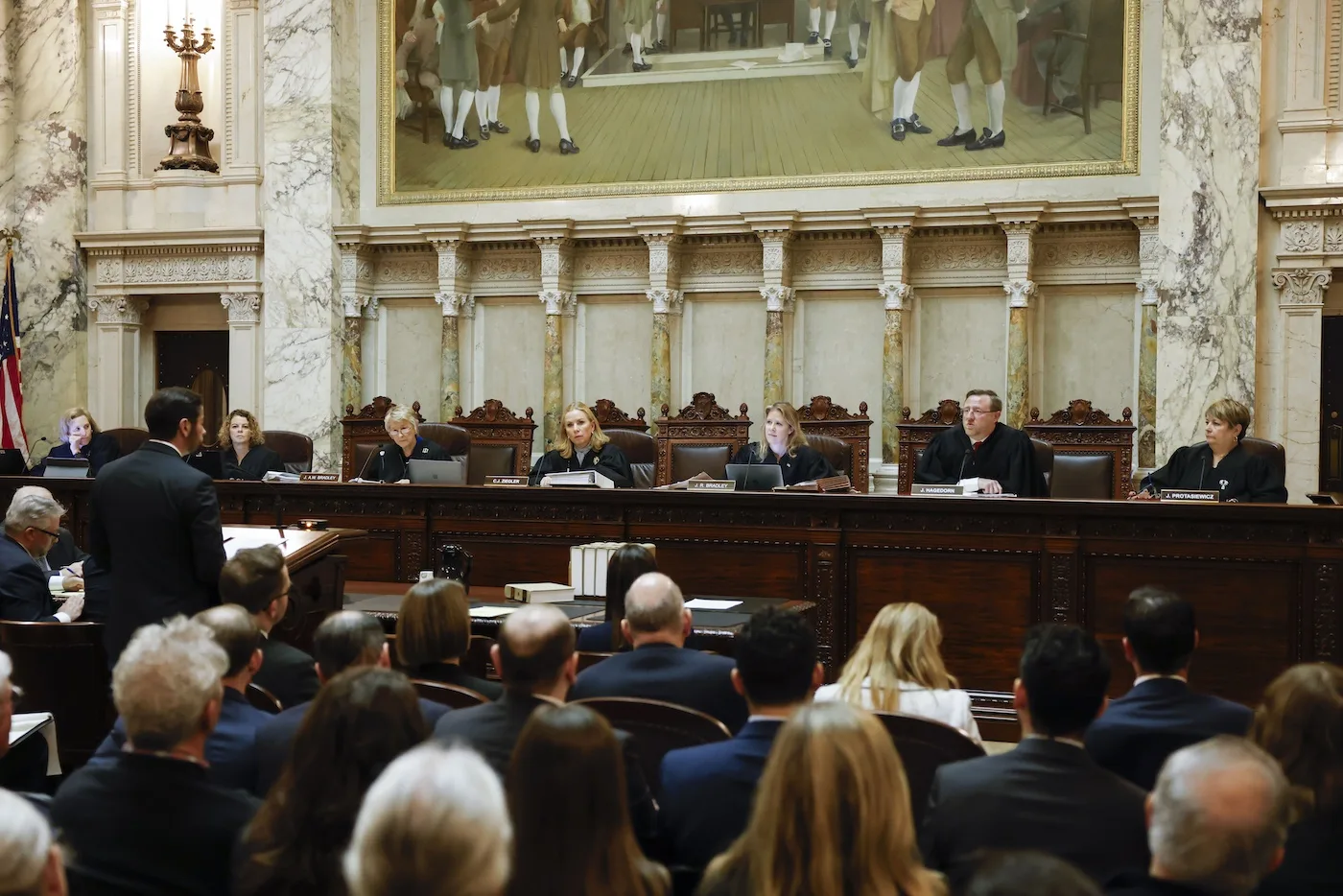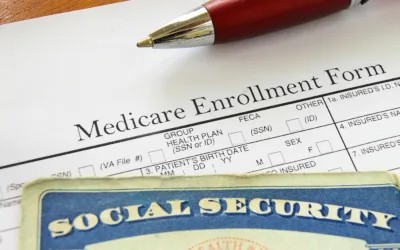
The Wisconsin Supreme Court listens to arguments in a redistricting hearing at the state Capitol in Madison on Nov. 21, 2023. (Ruthie Hauge/The Capital Times via AP, Pool)
A Dane County judge says parts of Act 10 are unconstitutional. The Wisconsin Supreme Court restores ballot drop boxes, rules against Republicans’ blocking funding of certain programs, and agrees to make a final decision on an 1849 abortion law.
Political conservatives in Wisconsin were dealt setbacks in three different court cases this week, with the Wisconsin Supreme Court on Friday reinstating absentee ballot drop boxes and rejecting legislative Republicans’ block on funding land conservation programs. On Wednesday, a Dane County judge ruled provisions of Act 10 are unconstitutional, raising doubts about the eventual fate of former Gov. Scott Walker’s public sector union-busting law.
The drop box ruling is a reversal for the court, which had been under conservative control when justices limited their use two years ago—saying they could be placed only in local election clerks’ offices and no one other than the voter could return a ballot in person. Now under progressive control, the court determined on a 4-3 vote that officials can place ballot drop boxes around their communities in this fall’s elections.
After Janet Protasiewicz’s election victory in April 2023 flipped the court to liberal control, the progressive voter mobilization group Priorities USA asked the court in February to revisit the decision.
Justice Ann Walsh Bradley, one of the court’s four liberal justices, wrote for the majority that placing a ballot in a drop box set up and maintained by a local election clerk is no different than giving the ballot to the clerk, regardless of the box’s location. Local clerks have great discretion in how they administer elections and that extends to using and locating drop boxes, she added.
“Our decision today does not force or require that any municipal clerks use drop boxes,” Bradley wrote. “It merely acknowledges what (state law) has always meant: that clerks may lawfully utilize secure drop boxes in an exercise of their statutorily-conferred discretion.”
All three conservative justices dissented. Justice Rebecca Bradley wrote that the liberals are simply trying to advance their political agenda and criticized them for ignoring the precedent set by the 2022 ruling.
“The majority in this case overrules (the 2022 decision) not because it is legally erroneous, but because the majority finds it politically inconvenient,” Bradley wrote. “The majority’s activism marks another triumph of political power over legal principle in this court.”
At least 29 other states allow for absentee ballot drop boxes, according to the U.S. Vote Foundation. The popularity of absentee voting exploded during the pandemic in 2020, with more than 40% of all voters casting mail ballots, a record high.
Republican politicians and conservative justices showed no opposition to drop boxes until former President Donald Trump claimed—without any evidence—that drop boxes facilitated cheating. An Associated Press survey of state election officials across the country revealed no cases of fraud, vandalism or theft that could have affected the results in 2020.
Dane County Clerk Scott McDonell called drop boxes a “common sense tool.” He said they make the election process more convenient and easier for rural and disabled voters and help reduce the number of ballots that arrive after election day too late to be counted.
“Having drop boxes in place for the 2024 elections in August and November will encourage civic participation in our democracy,” McDonell said in a statement.
Dane County Judge Tosses Part of Act 10
On Wednesday, Dane County Judge Jacob Frost ruled against the constitutionality of certain parts of Act 10, the 2011 state law that, for practical purposes, wiped out collective bargain rights for many—but not all—public sector unions, weakening workers’ ability to be paid and compensated fairly. It was the exceptions that Frost noted in putting Act 10’s future on shaky ground.
While most unions were labeled “general” in the law, Republican legislators also created a “public safety” label and applied it to some law enforcement and firefighter unions, all of whom supported Walker in the 2010 election that made him governor.
“Can you explain a law’s differing treatment of different groups in a way that makes sense and supports a public policy?” Frost said in his written order. “If not, the different treatment is irrational and violates the right to equal protection of the laws. Because nobody could provide this Court an explanation that reasonably showed why municipal police and fire and State Troopers are considered public safety employees, but Capitol Police, UW Police and conservation wardens, who have the same authority and do the same work, are not.”
Frost instructed the pro-labor groups that brought the case to state what sections of Act 10 they believe “must be severed and struck under my ruling and Defendants shall respond on this issue as well.”
An appeal to the Wisconsin Supreme Court is all but certain, putting intense attention on Justice Protasiewicz, who took part in protests against Act 10 in 2011 and signed a petition that led to an attempt to recall Walker. Protasiewicz has said she would consider recusing herself from the case, but left open a final determination until seeing whatever case might reach the court.
Frost also appears to have signed a recall petition in 2011, several years before he became a judge, and he did not recuse himself from the case.
Supreme Court Knocks GOP Blocks on Stewardship Spending
In another Friday decision, the state Supreme Court ruled in a 6-1 decision that Republicans who control the Legislature’s budget committee cannot legally block conservation projects initiated by Democratic Gov. Tony Evers’ administration.
The decision marks a victory for Evers, whose relationship with Republican lawmakers has deteriorated since he took office in 2019.
The court ruled that when the Joint Finance Committee unilaterally blocked projects and land acquisitions funded with money from the Knowles-Nelson Stewardship Program, it violated the separation of powers between the legislative and executive branches.
The Legislature gave the executive branch the power to distribute stewardship money when it established the program, conservative Justice Rebecca Bradley wrote in the majority opinion. Once that power was conferred, lawmakers lacked authority to reject decisions on how to spend the money short of rewriting spending laws, she wrote.
The Legislature created the stewardship program in 1989. The state Department of Natural Resources uses money from the program to fund grants to local governments and nongovernmental organizations for environmental projects. The gubernatorial cabinet agency also uses money from the program to acquire land for conservation and public use.
Conservative Chief Justice Annette Ziegler was the lone dissenting justice. She wrote that the justices should have allowed the case to work its way through lower courts. She also said the court’s liberal majority “handpicked” the stewardship question.
“What’s the rush?” Ziegler wrote. “There is absolutely no good reason to have handpicked this case and this one issue, ahead of all the other cases, taking it out of turn, and placing it to the front of the line.”
The case involves only the dispute over Stewardship funds, but there are suits and disputes over several other instances where the Joint Finance Committee is blocking the allocation of funds even though they have been approved by the full Legislature and signed into law—they include money to address water contaminated with industrial chemicals known as PFAS; a reading and literacy mandate for schools; and funds designated to help west central Wisconsin deal with a healthcare crisis after the closing of two hospitals and several clinic sites.
Reproductive Rights Next?
Also last week, the state Supreme Court agreed to consider two different cases that could determine the fate of an 1849 law related to abortion and possibly enshrine abortion rights as being protected by the Wisconsin Constitution.
A Dane County judge ruled last year that the 1849 statute outlaws attacking a woman in an attempt to kill her unborn baby but does not ban abortions. Sheboygan County District Attorney Joel Urmanski, a Republican, asked the justices in February to take up the case directly and overturn the ruling, without letting an appeal move through the lower trial and appeals courts.
Days later, Planned Parenthood of Wisconsin sued Urmanski and asked the Supreme Court to take their case up directly in order to rule that the state constitution’s declaration that people have a right to life, liberty and the pursuit of happiness means women have a right to control their own bodies — essentially asking the court to declare a constitutional right to abortion.
The justices voted unanimously to take up Urmanski’s appeal and voted 4-3 to take the Planned Parenthood case—the court’s four liberal justices voting to take that case and the three conservative justices voting against.
“I am pleased that the Court has decided to address this pressing issue,” said Dr. Kristin Lyerly, an obstetrician-gynecologist and Democratic candidate for Congress in the 8th District, who is also a party in the challenge to the 1849 statute. “I am confident that this case will affirm Wisconsin’s proud tradition of freedom and equality.”
The Associated Press contributed to this report.
Support Our Cause
Thank you for taking the time to read our work. Before you go, we hope you'll consider supporting our values-driven journalism, which has always strived to make clear what's really at stake for Wisconsinites and our future.
Since day one, our goal here at UpNorthNews has always been to empower people across the state with fact-based news and information. We believe that when people are armed with knowledge about what's happening in their local, state, and federal governments—including who is working on their behalf and who is actively trying to block efforts aimed at improving the daily lives of Wisconsin families—they will be inspired to become civically engaged.


Opinion: La Crosse Area Assembly Candidate Ryan Huebsch should be held accountable for racially insensitive social media history
A Better Wisconsin Together calls for candidate Ryan Huebsch to be held accountable for racially insensitive social media history. Across zip codes...

13 wildest lies Trump told in the debate with Kamala Harris
Ex-President Donald Trump and Vice President Kamala Harris met for their first presidential debate—and Trump unleashed a barrage of lies and...

Trump’s threats to Medicare and Social Security will be spotlighted in Wisconsin
A top Biden surrogate comes to Wausau, Green Bay, and Milwaukee to talk to Wisconsinites about what they could lose under a second Trump term....

Opinion: Trump’s election lies go way back and are a true threat to democracy
The former president will repeat a message over and over until it becomes believed, even if it’s wrong. At recent campaign rallies in Michigan and...





